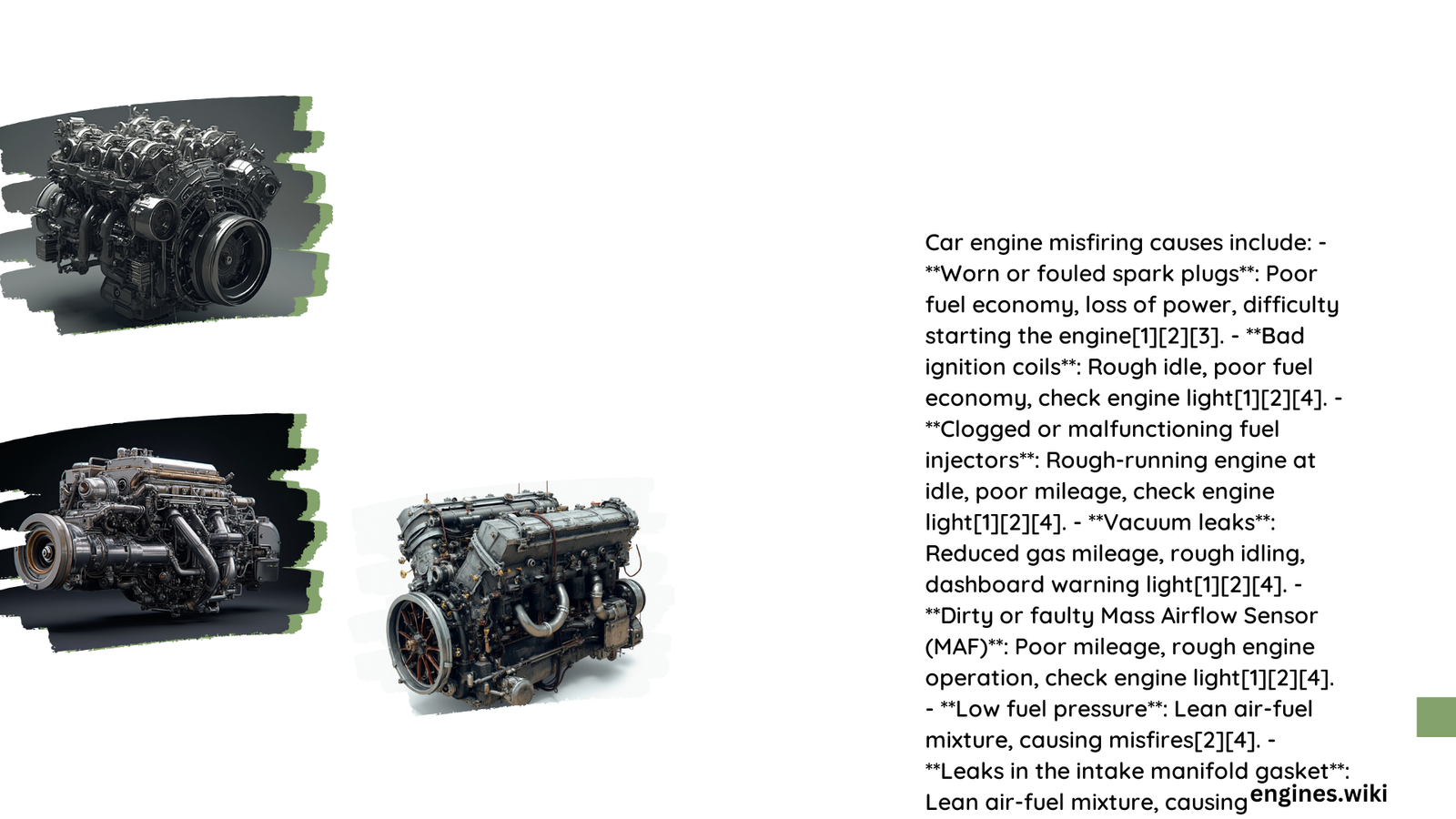Car engine misfiring is a common issue that can significantly impact vehicle performance and fuel efficiency. The primary causes include spark plug failure, fuel system problems, ignition coil issues, and vacuum leaks. These factors can disrupt the combustion process, leading to irregular engine operation, reduced power output, and potential long-term damage if left unaddressed.
What Are the Main Causes of Car Engine Misfiring?
Engine misfires occur when the combustion process in one or more cylinders is disrupted. This can happen due to various reasons, including:
- Faulty spark plugs
- Fuel system issues
- Ignition coil problems
- Vacuum leaks
- Worn engine components
Let’s explore each of these causes in detail.
How Do Spark Plug Issues Contribute to Engine Misfiring?

Spark plugs play a crucial role in the combustion process, and their failure is one of the most common causes of engine misfires. Here’s what you need to know:
Types of Spark Plugs and Their Lifespan
- Copper spark plugs: Least expensive, but have the shortest lifespan (30,000-50,000 miles)
- Platinum spark plugs: More durable, lasting up to 100,000 miles
- Iridium spark plugs: Most expensive but can last up to 120,000 miles or more
Signs of Worn Spark Plugs
- Poor fuel economy
- Loss of engine power
- Difficulty starting the engine
- Rough idling
Recommended Replacement Intervals
| Vehicle Age | Recommended Replacement Interval |
|---|---|
| Older vehicles | Every 12,000-15,000 miles |
| Newer vehicles | Every 60,000-100,000 miles |
Always consult your vehicle’s manual for specific recommendations.
What Fuel System Issues Can Lead to Engine Misfiring?
The fuel system is responsible for delivering the right amount of fuel to the engine. Problems in this system can cause misfires due to improper fuel delivery. Here are the key components to consider:
Fuel Injectors
- Function: Spray fuel into the combustion chamber
- Issues: Clogging, wear, or electrical problems can cause improper fuel delivery
- Symptoms: Rough idling, poor acceleration, decreased fuel efficiency
Fuel Filters
- Purpose: Remove contaminants from the fuel
- Problem: Clogged filters restrict fuel flow
- Replacement interval: Typically every 20,000-40,000 miles, but varies by vehicle
Fuel Pressure
- Normal range: 30-50 PSI for most gasoline engines
- Low pressure signs: Engine hesitation, misfires, and stalling
- Causes of low pressure: Weak fuel pump, clogged filter, or leaking fuel lines
How Do Ignition Coil Problems Affect Engine Performance?
Ignition coils are responsible for converting low voltage from the battery into the high voltage needed to create a spark. Faulty coils can lead to misfires and other engine issues.
Ignition Coil Specifications
- Primary resistance: Typically 0.5-2 ohms
- Secondary resistance: Several thousand ohms
- Voltage output: 5,000-30,000 volts
Diagnostic Techniques for Ignition Coils
- Use a multimeter to check resistance
- Measure voltage output
- Perform a swap test to isolate the problem coil
What Impact Do Vacuum Leaks Have on Engine Misfiring?
Vacuum leaks can disrupt the air-fuel mixture, leading to engine misfires and poor performance.
Vacuum Leak Detection Methods
- Vacuum gauge: Measures vacuum pressure in the intake manifold
- Smoke test: Introduces smoke into the intake system to visually identify leaks
- Propane test: Uses propane to detect changes in engine RPM near leak areas
Normal Vacuum Pressure Readings
- Idle: 15-20 inches of mercury (inHg)
- Lower readings: Indicate potential vacuum leaks
Effects of Vacuum Leaks on Engine Performance
- Lean air-fuel mixture
- Rough idling
- Reduced fuel efficiency
- Increased emissions
How Can You Prevent Car Engine Misfiring?
To minimize the risk of engine misfires, follow these preventive measures:
- Adhere to the manufacturer’s maintenance schedule
- Replace spark plugs at recommended intervals
- Keep the fuel system clean and maintain proper fuel pressure
- Regularly inspect and replace ignition coils as needed
- Check for and repair vacuum leaks promptly
By understanding the causes of car engine misfiring and taking proactive steps to maintain your vehicle, you can ensure optimal engine performance and longevity.
